Comfort and Joy
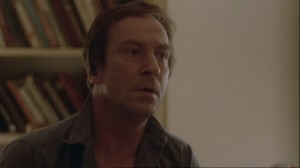 It must be refreshing to know that your life is absolutely meaningless. I’m not talking about your life being meaningless from a religious perspective or because you are such a nothing person that you will never make an impact on anyone. But rather that what you do is limited in influence, even if you’re the best at it. You’re not in politics, or in the military, or a teacher, or a social worker. But, instead, you exist — whether it be through your job or otherwise — on a plane where you’re a genial but background figure. You’re a supporting character in the lives of your peers. A case could be made that such an existence would be despairing, but it probably takes the pressure off considerably. It’s a bounty for those who lack ambition, (which is most people).
It must be refreshing to know that your life is absolutely meaningless. I’m not talking about your life being meaningless from a religious perspective or because you are such a nothing person that you will never make an impact on anyone. But rather that what you do is limited in influence, even if you’re the best at it. You’re not in politics, or in the military, or a teacher, or a social worker. But, instead, you exist — whether it be through your job or otherwise — on a plane where you’re a genial but background figure. You’re a supporting character in the lives of your peers. A case could be made that such an existence would be despairing, but it probably takes the pressure off considerably. It’s a bounty for those who lack ambition, (which is most people).
 Alan “Dickey” Byrd, the main character in Bill Forsyth’s Comfort and Joy, is a morning radio DJ who performs imbecilic antics at work — silly voices, clichés, etc. But he commits to it. The title of the film is not just about him finding happiness after his longtime girlfriend leaves him, but realizing that he maintains his skill on the radio — which he visibly takes a lot of pleasure in. And, subtly throughout the film, Forsyth interjects news reports while Alan is at the station, almost always about the most mundane things. Central to these reports is a story about a panda who has been imported from China to Scotland (the film takes place mostly in the suburbs of Glasgow), and the zoo has recently discovered she is pregnant. Why should we care about whether or not a panda is pregnant?
Alan “Dickey” Byrd, the main character in Bill Forsyth’s Comfort and Joy, is a morning radio DJ who performs imbecilic antics at work — silly voices, clichés, etc. But he commits to it. The title of the film is not just about him finding happiness after his longtime girlfriend leaves him, but realizing that he maintains his skill on the radio — which he visibly takes a lot of pleasure in. And, subtly throughout the film, Forsyth interjects news reports while Alan is at the station, almost always about the most mundane things. Central to these reports is a story about a panda who has been imported from China to Scotland (the film takes place mostly in the suburbs of Glasgow), and the zoo has recently discovered she is pregnant. Why should we care about whether or not a panda is pregnant?
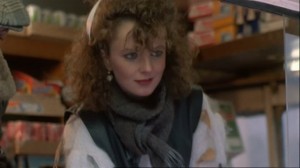 So when Alan (played by Bill Paterson, who has the same facial structure as Jerry Orbach) tries to add meaning to his life by making a radio documentary about the ice cream truck turf war he finds himself in the middle of, it’s important that he is trying to stretch his limits. At the minimum, Alan needs to find what those limits are. His boss doesn’t take him seriously and thinks he’s delusional about the turf war, and so sends him off to a self-involved psychiatrist* for examination. And every time Alan tries to explain the feuding ice cream vendors to someone new, he can hear how ridiculous he sounds. It takes him a while to realize that he’s the central character of The Godfather. Only, instead of killing people and other criminal activity, he’s a mediator in an ice cream war.
So when Alan (played by Bill Paterson, who has the same facial structure as Jerry Orbach) tries to add meaning to his life by making a radio documentary about the ice cream truck turf war he finds himself in the middle of, it’s important that he is trying to stretch his limits. At the minimum, Alan needs to find what those limits are. His boss doesn’t take him seriously and thinks he’s delusional about the turf war, and so sends him off to a self-involved psychiatrist* for examination. And every time Alan tries to explain the feuding ice cream vendors to someone new, he can hear how ridiculous he sounds. It takes him a while to realize that he’s the central character of The Godfather. Only, instead of killing people and other criminal activity, he’s a mediator in an ice cream war.
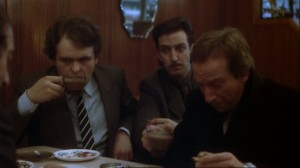 Forsyth knows exactly what he’s doing in these scenes, as he specialized in the “overwhelmed fish just above the water” genre (Local Hero, Housekeeping, and Gregory’s Girl, before faltering with Being Human**) Alan Bird is essentially a parrot (Bird) who co-opts metaphors from his acquaintances and never manages to understand what exactly he’s saying. Essentially, Comfort and Joy is an Alice in Wonderland story, as Alan, drawn in by the physical beauty of Charlotte (Clare Grogan) follows her truck with his car, into a metaphorical rabbit hole. In mysterious territory –the ice cream truck he’s following is owned by the Mr. Bunny company — he finds himself in well over his head as an ice cream mediator. Forsyth constantly points out that Alan doesn’t have a clue about what he’s doing; there’s a hilarious scene where he draws a ridiculously oversimplified diagram of the various parties he’s dealing with and what their interests are. When his kleptomaniac girlfriend leaves him at the beginning of the film, it’s clear he was treading water there, too, and was just happy to be with a woman who was physically out of his league. His friend Colin comes over to console him, and with the very few things left in the house, tries and fails to explain why the items left are important reflections of Alan’s personality (“this little table … is you”).
Forsyth knows exactly what he’s doing in these scenes, as he specialized in the “overwhelmed fish just above the water” genre (Local Hero, Housekeeping, and Gregory’s Girl, before faltering with Being Human**) Alan Bird is essentially a parrot (Bird) who co-opts metaphors from his acquaintances and never manages to understand what exactly he’s saying. Essentially, Comfort and Joy is an Alice in Wonderland story, as Alan, drawn in by the physical beauty of Charlotte (Clare Grogan) follows her truck with his car, into a metaphorical rabbit hole. In mysterious territory –the ice cream truck he’s following is owned by the Mr. Bunny company — he finds himself in well over his head as an ice cream mediator. Forsyth constantly points out that Alan doesn’t have a clue about what he’s doing; there’s a hilarious scene where he draws a ridiculously oversimplified diagram of the various parties he’s dealing with and what their interests are. When his kleptomaniac girlfriend leaves him at the beginning of the film, it’s clear he was treading water there, too, and was just happy to be with a woman who was physically out of his league. His friend Colin comes over to console him, and with the very few things left in the house, tries and fails to explain why the items left are important reflections of Alan’s personality (“this little table … is you”).
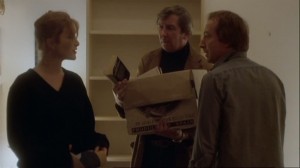 Such a scene predates the one in Albert Brooks’ Mother, where Brooks sits alone in a mostly empty house bereft of furniture (his wife had just left him), and Brooks spends his time trying the perfect spot to put his chair, in the middle of an enormous living room. Brooks moves back in with his mother to try to figure out what’s wrong with him, but Alan has nothing to revert to, and can only take pride in his job.
Such a scene predates the one in Albert Brooks’ Mother, where Brooks sits alone in a mostly empty house bereft of furniture (his wife had just left him), and Brooks spends his time trying the perfect spot to put his chair, in the middle of an enormous living room. Brooks moves back in with his mother to try to figure out what’s wrong with him, but Alan has nothing to revert to, and can only take pride in his job.
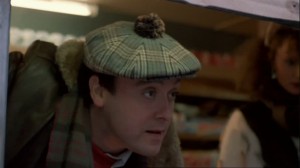 That’s one of the unique things about Comfort and Joy, that it comes out of a time (1984), where there weren’t hundreds of radio stations and TV shows. If a DJ says something on the air, most of the locals are likely to hear it, because there isn’t much else they’d be listening to. That’s a key point to Alan’s survival; he knows he actually reaches people. He isn’t reduced to a tiny niche on the Internet, as most of us are now. Alan’s level of celebrity is just as small as the town he’s famous in; which is how he gets away with being a local personality, but not above being overly disrespected. He may know his place, but he’s not a conformist who’s just worming his way through what he’s been given, just as Forsyth did with his movies. And like most Forsyth films, Comfort and Joy is warm and gentle without being cloying or maudlin. And it somehow avoids off-putting levels of cynicism. Like Alan, it’s just the right amount of not important.
That’s one of the unique things about Comfort and Joy, that it comes out of a time (1984), where there weren’t hundreds of radio stations and TV shows. If a DJ says something on the air, most of the locals are likely to hear it, because there isn’t much else they’d be listening to. That’s a key point to Alan’s survival; he knows he actually reaches people. He isn’t reduced to a tiny niche on the Internet, as most of us are now. Alan’s level of celebrity is just as small as the town he’s famous in; which is how he gets away with being a local personality, but not above being overly disrespected. He may know his place, but he’s not a conformist who’s just worming his way through what he’s been given, just as Forsyth did with his movies. And like most Forsyth films, Comfort and Joy is warm and gentle without being cloying or maudlin. And it somehow avoids off-putting levels of cynicism. Like Alan, it’s just the right amount of not important.
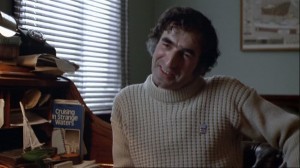 * The scene with the psychiatrist is very funny on its own. But it does lead to one of the film’s few problems, which is putting lawyers and psychiatrists into a movie that doesn’t need them. And so the final 25 minutes is overloaded with story and the energy subsequently flags. Forsyth has even admitted publically that he probably could have made the movie about the DJ and dropped the ice cream plot (which is based on a real ice cream war in Scotland). But at the time he was afraid there wouldn’t be enough to the film.
* The scene with the psychiatrist is very funny on its own. But it does lead to one of the film’s few problems, which is putting lawyers and psychiatrists into a movie that doesn’t need them. And so the final 25 minutes is overloaded with story and the energy subsequently flags. Forsyth has even admitted publically that he probably could have made the movie about the DJ and dropped the ice cream plot (which is based on a real ice cream war in Scotland). But at the time he was afraid there wouldn’t be enough to the film.
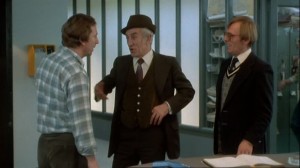 ** Being Human suffered major studio interference and Forsyth disowned it. He retired after Gregory’s Two Girls, his 1999 sequel to Gregory’s Girl.
** Being Human suffered major studio interference and Forsyth disowned it. He retired after Gregory’s Two Girls, his 1999 sequel to Gregory’s Girl.



